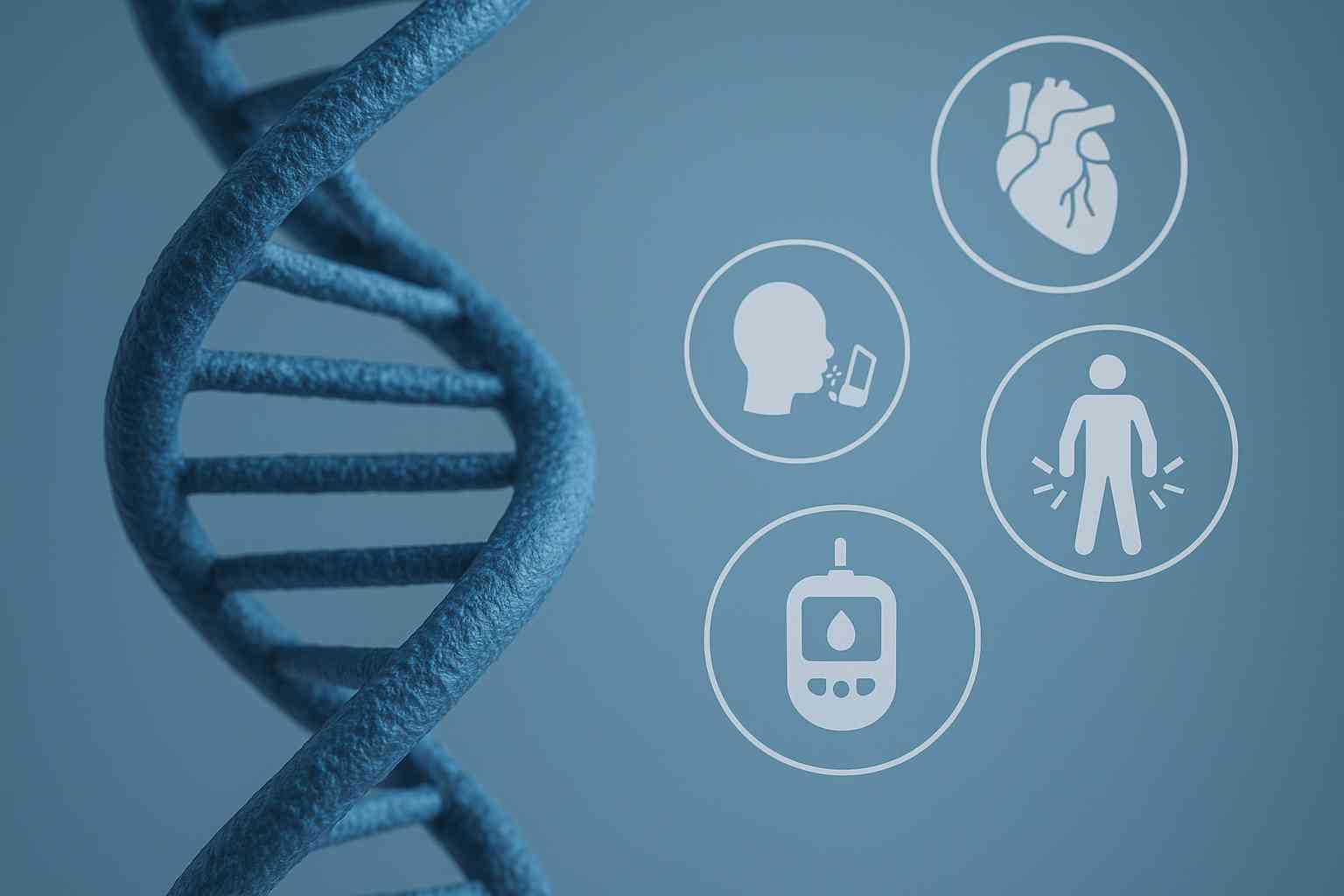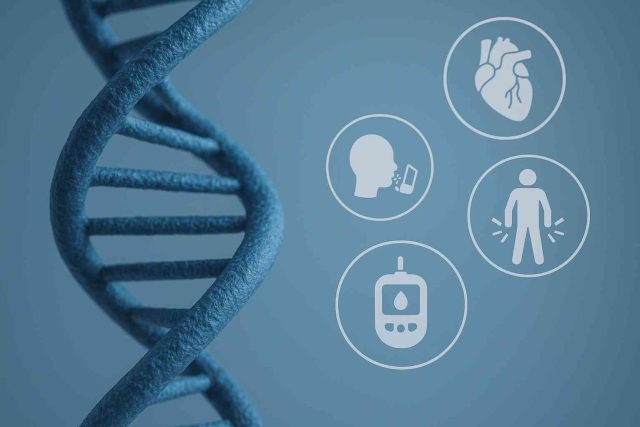
Have you ever wondered if your family’s medical history is your health forecast? When chronic diseases seem to run in the family, it’s natural to question whether your DNA has already drawn your fate. The good news is that heredity is just one piece of the puzzle. This article dives into the science behind the question, “Is chronic illness hereditary?”, and explains what you can do to protect your health—even when your genes may raise your risk.
Table of Contents
- What Does It Mean for a Chronic Illness to Be Hereditary?
- Genetic Predisposition vs. Lifestyle: A Complex Interplay
- Common Chronic Illnesses With Hereditary Components
- Managing Your Genetic Risks: What You Can Do
- Conclusion & FAQs
What Does It Mean for a Chronic Illness to Be Hereditary?
Chronic illnesses are long-term health conditions that often persist for years or even a lifetime. These include conditions like diabetes, heart disease, asthma, and autoimmune disorders. But when we ask, “Is chronic illness hereditary?”, we’re really asking if our genetic blueprint can pass these conditions down through generations.
A hereditary illness means the condition—or at least a predisposition to it—is passed from parents to children through genes. This doesn’t mean you’ll automatically develop the disease if it runs in your family. Rather, your genetic makeup might increase your susceptibility. Think of your genes as the script, but your environment and habits direct the performance.
Interestingly, some conditions have stronger genetic links than others. For example, certain types of Type 2 diabetes have a robust hereditary component, but lifestyle changes can significantly delay or even prevent their onset. So, while you may inherit the risk, you’re not guaranteed the disease.
Genetic Predisposition vs. Lifestyle: A Complex Interplay
Genetics can be a powerful factor, but they rarely act alone. Many chronic diseases arise from the interaction between genetic predispositions and environmental or lifestyle choices. This concept is known as “gene-environment interaction.”
For instance, if you have a family history of high blood pressure, you may be more sensitive to salt, making dietary habits crucial. Similarly, someone with inherited cholesterol abnormalities—such as familial hypercholesterolemia—might be at greater risk of heart disease if they consume a high-fat diet or avoid regular exercise.
Stress, smoking, exposure to environmental toxins, and diet all play significant roles. In fact, research from Healthcare.pro supports that modifying lifestyle factors can lower the risk of developing even genetically-influenced diseases. So, while you might carry the blueprint, how that blueprint gets “read” can be significantly influenced by your daily choices.
Additionally, epigenetics—the study of how behaviors and environment affect gene expression—shows that lifestyle changes may even affect how certain genes behave. That’s an empowering concept: you can turn down the volume on high-risk genes with the right habits.
Common Chronic Illnesses With Hereditary Components
Several chronic conditions show strong hereditary patterns. Knowing your family’s health history can provide early warning signs and help guide preventative strategies.
1. Type 2 Diabetes
Type 2 diabetes has a clear hereditary influence. If one or both of your parents have it, your risk increases significantly. However, maintaining a healthy weight, eating a balanced diet, and staying active can dramatically reduce your chances of developing the disease—even if it runs in your family.
Branded medications like Jardiance and Ozempic are commonly prescribed when lifestyle changes aren’t enough. Still, prevention remains a powerful tool.
2. Cardiovascular Disease
High blood pressure, heart disease, and stroke often appear in multiple generations. If your parent had a heart attack before age 55 (for men) or 65 (for women), your risk may be higher. Conditions like familial hypercholesterolemia can raise LDL cholesterol to dangerous levels early in life.
Fortunately, statins like Lipitor or Crestor, along with diet and exercise, can help manage this risk.
3. Autoimmune Diseases
Diseases like lupus, multiple sclerosis, and rheumatoid arthritis can run in families. While a specific gene might not cause the illness, several gene variants can increase susceptibility.
Environmental triggers—such as infections or stress—may “activate” these genes. Treatments often include immunosuppressants like Humira or Enbrel, but early detection can improve long-term outcomes.
4. Mental Health Disorders
While not traditionally categorized as chronic illnesses, mental health disorders such as depression, bipolar disorder, and schizophrenia can be long-lasting and often have genetic components. If a parent or sibling has a mental health condition, your own risk may be higher.
That said, therapy, lifestyle management, and medications like Zoloft or Abilify can make a tremendous difference.
Managing Your Genetic Risks: What You Can Do
So, is chronic illness hereditary? Often, yes—but it’s not the end of the story. Understanding your genetic risks is only the first step. What you do with that information makes the difference.
First, build a complete family health history. Note which relatives have had chronic illnesses, their age of diagnosis, and any patterns. Share this information with your doctor. This can guide early screening or testing, and potentially identify opportunities for lifestyle intervention.
Next, focus on prevention. Eating a diet rich in fruits, vegetables, whole grains, and lean proteins can help reduce the impact of high-risk genes. Regular exercise improves blood sugar regulation, lowers blood pressure, and strengthens the cardiovascular system. Avoid smoking and limit alcohol intake—both are known to trigger genetic vulnerabilities.
Routine screenings are critical. If you’re at risk for colon cancer, for example, your doctor might recommend earlier or more frequent colonoscopies. Genetic counseling may also be helpful if your family has a history of inherited conditions like BRCA-related breast cancer or cystic fibrosis.
Finally, don’t underestimate the power of mental well-being. Chronic stress can trigger inflammation and worsen the expression of disease-prone genes. Practices like mindfulness, meditation, and therapy are excellent preventive tools.
For more resources on managing chronic health risks, explore top-rated content on Health.HealingWell.com.
Conclusion & FAQs
Understanding whether a chronic illness is hereditary gives you an edge—not a verdict. While genes do play a role in many long-term diseases, they rarely work in isolation. By learning your family history and making informed lifestyle choices, you can actively shape your health future. The path may begin in your DNA, but it’s your daily actions that determine where it leads.
FAQs
Is chronic illness always hereditary?
No, not all chronic illnesses are hereditary. Many are caused by lifestyle factors or environmental exposures, though genetics can increase risk.
Can you prevent a hereditary chronic illness?
While you can’t change your genes, you can often delay or prevent illness onset through lifestyle changes, regular screenings, and early interventions.
How do I know if I’m genetically at risk?
Start by building a family medical history and discussing it with your doctor. Genetic testing or counseling may also be recommended.
Are mental health disorders hereditary too?
Yes, many mental health disorders have hereditary components. However, early therapy, medication, and support can make a big difference in outcomes.
Where can I get trustworthy medical advice about chronic illness?
Visit Healthcare.pro for up-to-date guidance and consult a licensed healthcare provider for personalized advice.
This content is not medical advice. For any health issues, always consult a healthcare professional. In an emergency, call 911 or your local emergency services.




